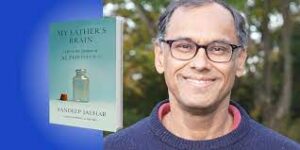December 28, 2023, Edit: I was seated at Christmas dinner just days ago next to a woman with Alzheimer’s. I can’t express enough how much having read this book helped me. I enjoyed every minute of the three-hour dinner, most of which was in conversation with this woman. I got to know about her very interesting life, including time spent living at a commune and her career as a top seamstress, and her repeating things over and over didn’t bother me one bit. I knew how to reply and I knew how to have this experience in a positive way. Thank you, Dr. Jauhar!
Telling someone, anyone, to read a great book is right up there with one of my least favorite things to do. Another is recommending movies. We are all so different that our experiences and thus, perspectives, vary greatly. So, who am I to say a book or movie I like would be enjoyed by someone/anyone, else?
My Father’s Brain, by Dr. Sandeep Jauhar, is different. This is a book about a subject that every single one of us will be touched by in some way in our lifetime. The subject is Alzheimer’s Disease. Just now, 1 in every 10 Americans over the age of 65 have Alzheimer’s or related Dementia. This number is expected to double in about 25 years.
By the time I was 18 years old, I myself had my first direct experience with the disease. My grandmother, whom I suggested move into the same condominium building as me to help her out, began accusing me of stealing from her. On the contrary, I was paying her bills! I didn’t know anything about Alzheimer’s at this point and was completely crushed by her behavior. It wasn’t long after that her disease progressed and she was moved to a special care facility. I was resentful and angry at her even when she died. Afterall, I was 18 years old, working 3 jobs, and just trying to help out. If I’d read this book back then, I am 100% certain I would not have been angry at her.
Soon, following this experience, I was watching the Academy Awards and a young documentarian received an Oscar for a short film she made about her own experience with her mother’s Dementia. I remember there being a sample of the woman’s work and an explanation from her about how she approached her mom’s drastic change in behavior. She spoke about being so frustrated with her mom in the very early stages of the disease, having to repeat herself and explain things as though her mom was a child. Until one day, she decided to get out her video camera and start filming. That day, she began a new approach in which she made light of everything to the point that both she and her mom laughed. A lot. This allowed their relationship to stay on a positive note and for both of them to continue to have a somewhat normal life. There are more details that I won’t go into, but I’m sure you get my point. I’ve searched for this documentary but have not been able to find it. If you do, PLEASE let me know!
I try not to ask too much of my own children but if there was one thing they could gift to me right now, it would be to read this book cover to cover. A bonus would be if we could actually discuss the book, chapter by chapter. My biggest fear is not dying. My biggest fear is living. Living so long that I eventually get some form of Dementia and that my children don’t even recognize me anymore. This, to me, is the worst possible way to go out. I tear up just thinking about it. And this is not new just because I am aging. I have felt this way for decades!
Here is the publisher’s description of Dr. Jauhar’s gift to the world. I hope you read this book. I hope your children read it. I hope your parents read it. I hope everyone you know reads it. I read it in two days. (Actually listened on audio which is narrated in the author’s own voice.)
“In an intimate memoir rich with humor and heartbreak, Jauhar relates how his immigrant father and extended family felt, quarreled, and found their way through the dissolution of a cherished life. Along the way, he lucidly exposes what happens in the brain as we age and our memory falters, and explores everything from ancient conceptions of the mind to the most cutting-edge neurological―and bioethical―research. Throughout, My Father’s Brain confronts the moral and psychological concerns that arise when family members must become caregivers, when children’s and parents’ roles reverse, and when we must accept unforeseen turns in our closest relationships―and in our understanding of what it is to have a self. The result is a work of essential insight into dementia, and into how scientists, caregivers, and all of us in an aging society are reckoning with the fallout.”
Also published on Medium.

❤️❤️❤️❤️❤️ I have personal experience from Marco’s aunt suffering from dementia the past 8ish years. It was extremely hard to watch.
Omg!! Is she still with us? I’m so sorry… So sooooooo hard.
One of my dear friends the daughter of another dear friend both of whom I played tennis with and against is dealing with her mom. They’ve moved 4 times to accommodate her needs. It’s brutal. I stay in touch with the daughter primarily for support but also as a non-biased non-family member when she’s faced with very difficult decisions which I’m sure you know all about.
This book is fantastic!!
I’m just seeing this response! No, unfortunately she passed away early this year. It’s hard to say, but she is much better off and not suffering anymore. I honestly have never seen such a painful illness to watch someone go through. It’s so sad. That must’ve been so hard for them…that’s exactly what Marco’s mom went through trying to help her sister. Lots of moving and lots of really hard times. ❤️
I’m so sorry, Amy. But she must be at peace now. The disease is brutal and we just don’t talk about it enough until it’s too late. Like so many things.